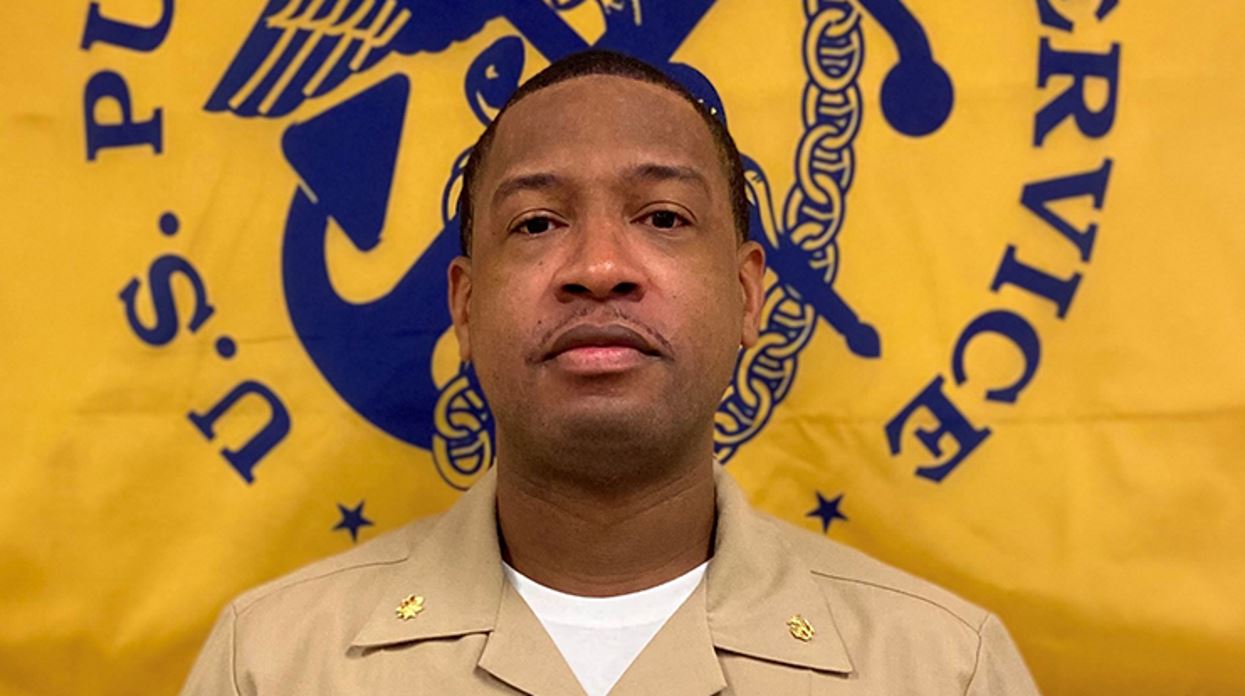
A Patriot and a Pharmacist: PharmD Alum Steven Rush and the U.S. Public Health Service

The former pro basketball player and MCPHS graduate has embarked on a nontraditional pharmacy career.
In 2009 Steven Rush was a professional basketball player in Nuremberg, Germany, then played the following season in Liverpool, England. He’d been a star at North Carolina A&T State University, one of the nation’s historically black colleges and universities (HBCU) and a school with a proud basketball tradition. After graduation Steven took the opportunity to play professionally overseas. Today Lieutenant Commander Rush works at the Department of Defense.
How does one make the journey from pro basketball in Europe to the DoD in 11 years? For Steven, it started earlier, when he decided to major in chemistry as an undergraduate. After Steven decided his basketball career had run its course, he used the educational foundation he had already laid to start working as a chemist back home in the United States. Upon his return, he worked for Talecris Biotherapeutics, Inc (now named Grifols), Biogen, and Syngenta. During that time that he developed a specific interest in pharmacy. So in 2012, four years out of college, Steven decided to apply to the MCPHS Accelerated PharmD program. He was accepted, and in May 2015 he completed his Doctor of Pharmacy degree.
During one of his rotations in the MCPHS program’s clinical year, Steven worked at the Food and Drug Administration. While there, he noticed that "some people were walking around in a military uniform, and I just started asking questions.” They turned out to be from the United States Public Health Service (USPHS), one of the nation’s eight uniformed services (others include the Army, Navy, and Marines). “The more I asked,” Rush says, “the more I learned about it. It’s pretty cool.”
The USPHS is a division of the Department of Health and Human Services; its most recognizable employee is the Surgeon General. Members are considered active-duty personnel, and they deploy for any national health disaster—Ebola, devastating hurricanes, COVID-19, etc.—but otherwise work at federal agencies. In that sense, though he is on active duty, Lieutenant Commander Rush says it’s a bit more like being in the reserves. USPHS officers work at places such as the Bureau of Prisons, Immigration and Customs Enforcement (ICE), and the Indian Health Service. In all these environments, the officers are working to provide healthcare for underserved communities, something Rush values.
ICE is where Steven started when he joined the USPHS, after some time working nights at a CVS and then a Publix pharmacy in Atlanta. ICE has its own healthcare system in place to serve detained immigrants, and Steven was named chief pharmacist at an ICE location in Lumpkin, Georgia. He handled clinical pharmacy work, but much of the role entailed healthcare administration duties akin to those of a Director of Pharmacy—a level of seniority and responsibility that might have taken much longer to achieve in another, more traditional pharmacy career. Rush’s next USPHS stop was with the FDA in Atlanta, where he says he drew heavily on the skills and knowledge he acquired in his MCPHS pharmaceutics class. At the FDA Rush was an investigator, going around to different companies to make sure they maintained safety and effectiveness in their pharmaceutical products. It gave him a behind-the-scenes look at a wide range of companies. In just a few short years, the USPHS had given him some rich experience.
“From a career standpoint, you can really do things [in the USPHS] that you may not have known as a traditional pharmacist. I never did a residency. I didn't do a fellowship. But I feel like I have just the same fulfillment in my career so far as the people who did those things do. Joining something like the USPHS has helped me progress without having to rely on a retail job. You get opportunities that you would have never known existed.”
More recently, Steven’s USPHS career has taken him to the Department of Defense, where he continues to work. He lives in the DC area and serves as Program and Personnel Manager. It’s a different type of job for Rush, almost a human resources-type role. The variety in his USPHS positions keeps things fresh, and Steven says he gets to do things that pharmacists might not usually get to do, even though they do have those skills and knowledge base. He’s been thrilled that his journey landed him at the USPHS—he loves the benefits, the career development, the freedom to choose where he wants to go. And he continues to work at a Publix pharmacy on some weekends and holidays to keep his traditional pharmacy proficiencies sharp.
Lieutenant Commander Rush considers his story a lesson for current and future pharmacy students: there are a whole lot of different things you can do with your pharmacy degree. “Be openminded about your career," Rush says. “It’s okay not to know what you want to do and to learn and explore. Learn what it is that you don’t like.” He adds, “Don’t get discouraged if you don’t get the residency, if you don’t get the fellowship. There are other careers out here.”
Interested in a career in pharmacy? Learn more about the MCPHS School of Pharmacy.
More University News
‘Choose Growth Over Fear’: MCPHS Celebrates the Class of 2025
Spring Commencement exercises honored nearly 1,700 graduates from across the University.
Capstone Competition Creates Pharmacy Entrepreneurs
Doctor of Pharmacy students presented their business ideas to industry leaders and competed for cash prizes.
‘I was Crushed:’ A Ski Injury Flips Physical Therapist’s Role from Professor to Patient
Dr. Gina Powers turns to one of her former students to guide her recovery after a sudden ACL tear on the slopes.
Scholarship on Display: Showcase Features Student Research
Thirty teams of students from the Worcester and Manchester campuses presented their work at the annual event.

